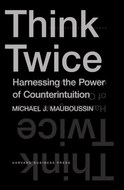|
I recently enjoyed reading Think Twice: Harnessing the Power of Counterintuition by Michael Mauboussin. It made for a nice counterbalance to Michael Gladwell's Blink, which I had read previously and which makes some fairly different arguments on the power of intuition. The biggest lesson is that both have their place, and wisdom comes into play in distinguishing which is relevant when.
The book's introduction mentions some famous examples of really smart people getting duped by relying on their intuition. Stephen Greenspan wrote an entire book on gullibility; Alan Greenspan lost money in Madoff's scheme; the LTCM geniuses "failed;" the Columbia disaster occurred despite early warnings; the banks in Iceland collapsed. Smart people can make really big mistakes! The author's three step approach to deal with this is as follows:
The author also outlines three major areas of mistakes:
Ch. 1: The Outside View
0 Comments
Your comment will be posted after it is approved.
Leave a Reply. |
Archives
June 2024
Categories
All
Subscribe |

 RSS Feed
RSS Feed
